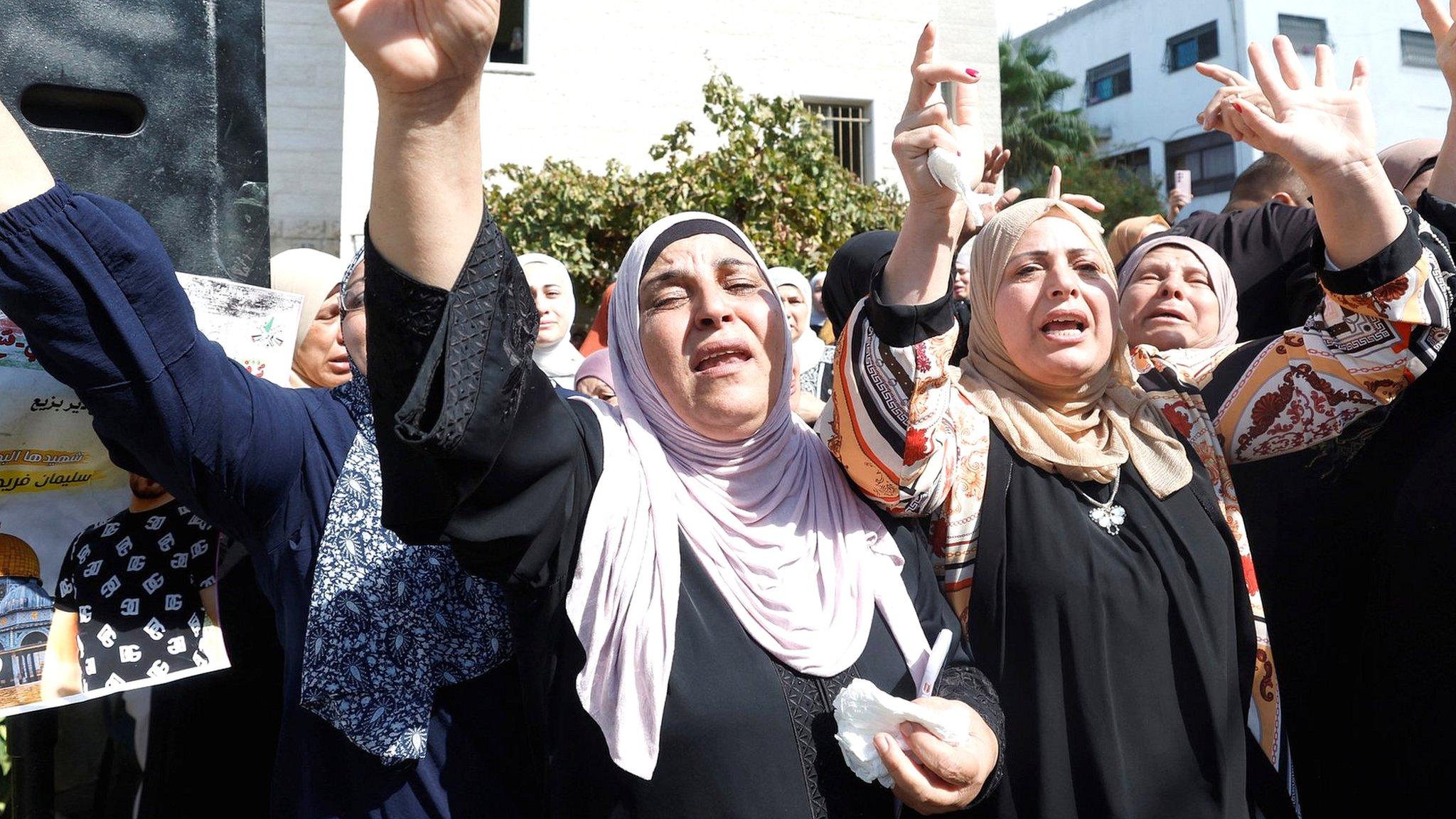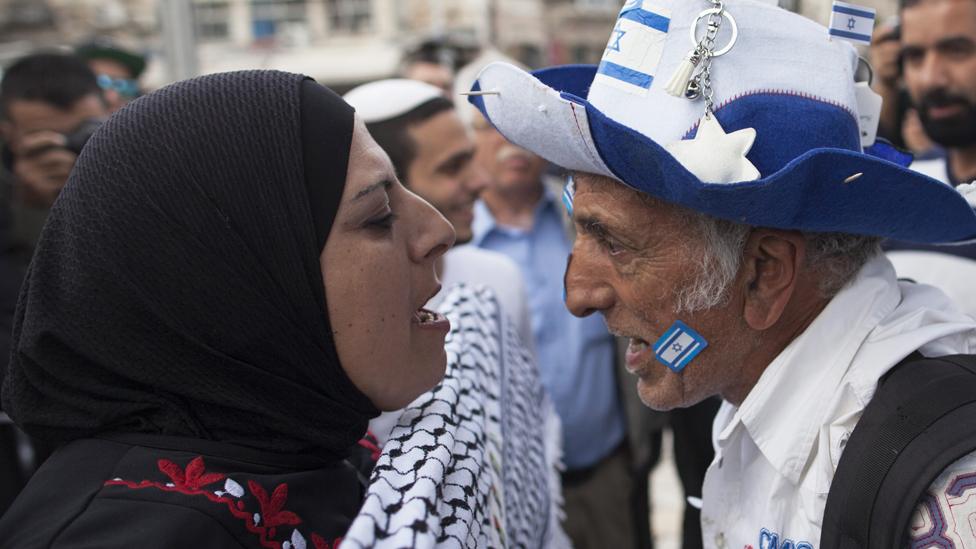Inside the West Bank district under harsh Israeli lockdown since Hamas attack
- Published
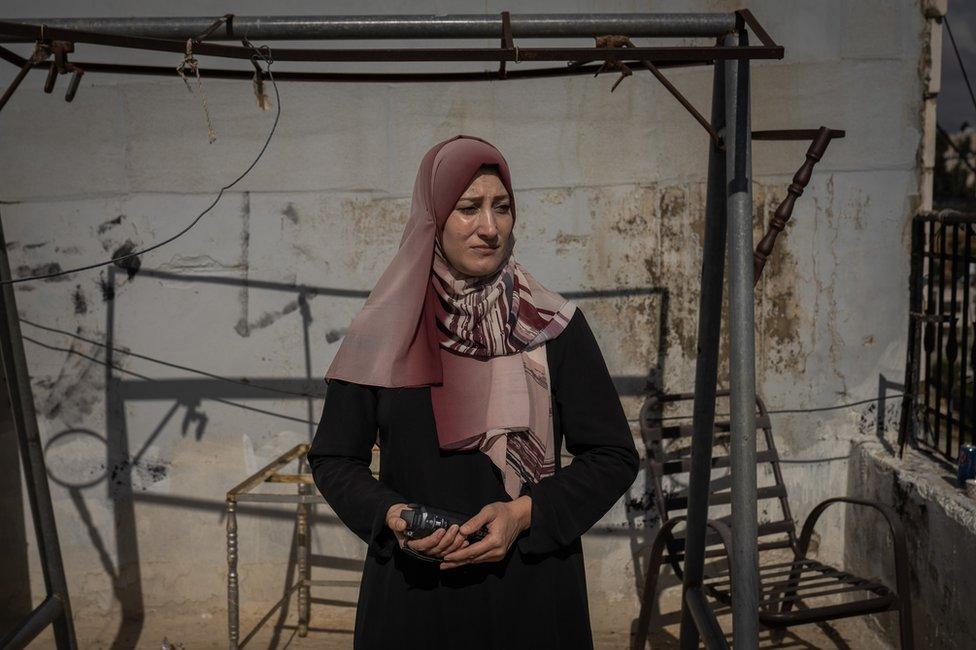
Areej Jabari holds her video camera on her rooftop in H2. "The goal is to divide us, to pressure us to leave," she said.
Fawaz Qafisha cracked his front door open a few inches, stuck his head through the gap and squinted against the sun. The street outside was almost completely dead, save for an Israeli soldier who was sitting on a garden chair placed opposite Qafisha's house, facing the front door.
Before Qafisha had even adjusted his eyes to the light and spotted us coming down the road towards him, the Israeli soldier had sprung to his feet, raised his rifle halfway and ordered Qafisha back inside.
The falafel cook, aged 52, gestured for us to hurry.
"This is how it is any time we try to open the door now," he said, as we entered.
"We are not even allowed to stand at our windows."
Qafisha, who was born and raised in Hebron, in the occupied West Bank, is a resident of H2, a dense and heavily fortified district that is home to 39,000 Palestinians and roughly 900 Israeli settlers considered some of the most extreme in the occupied territory. The Palestinians and Israelis of H2 are separated in some places here by just a few feet, and surrounded by cameras, cages, checkpoints, concrete blast walls and rolls of razor wire.
For more than 40 days now, since the Hamas attack on Israel, 11 Palestinian neighbourhoods within H2 - comprising about 750 families - have been under one of the harshest lockdowns imposed on the area for more than 20 years. H2's population is almost entirely Palestinian, but the district is under the total control of the Israeli military, which has for the past few weeks been forcing Palestinian residents back inside their homes at gunpoint.
Qafisha and his family of nine had barely left the house, he said. He did not want to take any risks. "You saw what happened when you arrived," he said. "We have a door we cannot open and windows we cannot look out from. We do not have any freedom. We are living in fear."
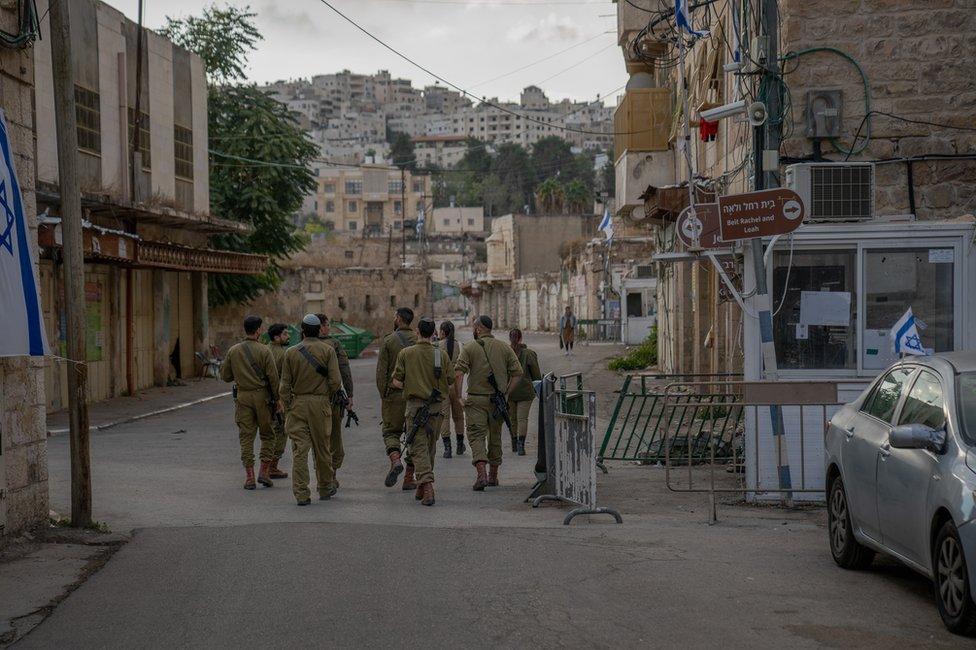
Israeli soldiers walk past Fawaz Qafisha's house. The Palestinian residents are not allowed on the street.
Qafisha's house sat just off Shuhada Street, once one of the busiest Palestinian market streets in Hebron. In 1994, a massacre of 29 Muslims by a Jewish extremist at a nearby mosque led to riots, which in turn prompted a crackdown by the Israeli army. The army forcibly closed Palestinian businesses and then welded shut the front doors of the Palestinian residents, on the Shuhada Street side.
Since then, the Palestinians of the area around Shuhada Street have lived through shifting restrictions on where they can go, when, and how. Flare-ups in the Israeli-Palestinian conflict have often led to some form of lockdown, but several residents told the BBC that this was the harshest they had ever experienced.
A few hundred feet up the road from Qafisha's house, Zleekhah Mohtaseb, a 61-year-old former tour guide and translator, was staring down from her rooftop, watching a young Israeli settler shouting to himself as he meandered slowly down Shuhada Street.
Mohtaseb had had spent all her six decades within a stone's throw of where she stood now, she said. Directly across Shuhada street, no more than 20 feet away, was Hebron Cemetery, where 10 generations of her family were buried. Once upon a time, she could walk straight across the street and into the cemetery. Now it took her an hour by car.
"The settlers," she said, shaking her head, as the young Israeli walked past her welded-shut front door. "They can do what they want. They are the chosen people."
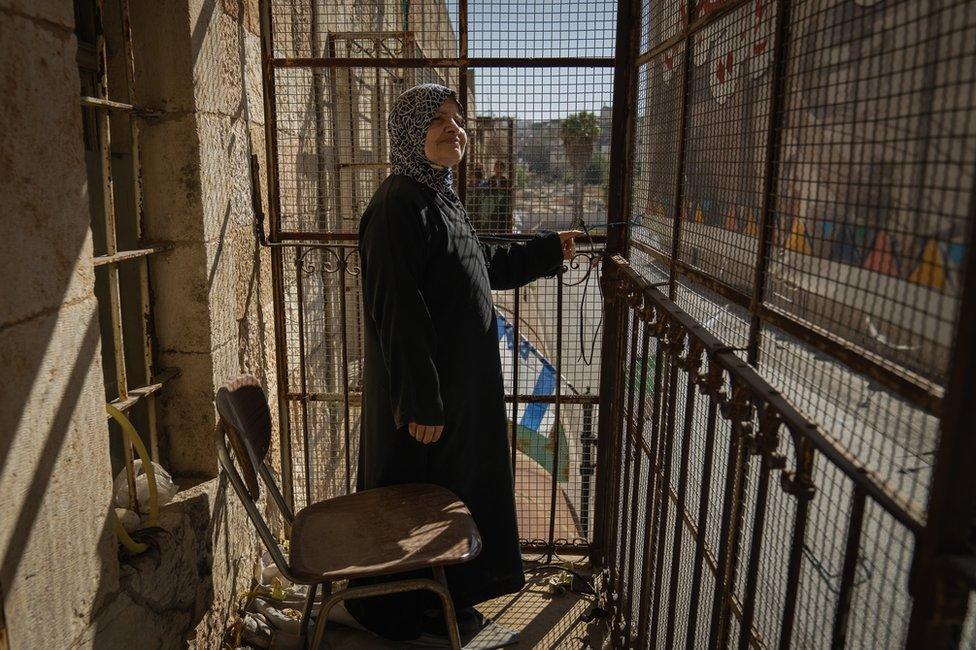
Zleekhah Mohtaseb on a typical Palestinian balcony on Shuhada Street, caged in to protect against stones.
Mohtaseb had seen a lot in her lifetime in Hebron, but the past 40 days had been among the most tense, she said. Hours after Hamas attacked Israel, in a murderous rampage that left an estimated 1,200 Israelis dead, Palestinian residents of H2 received messages from the Israeli military telling them that they were no longer allowed to leave their homes. Israeli soldiers began forcing people off the streets at gunpoint, including Mohtaseb. "Those first two weeks were hell," she said.
Two weeks after it began, the curfew in H2 relented slightly, allowing the Palestinians to leave their homes for certain hours on Sundays, Tuesdays, and Thursdays. Then this past Thursday, as Mohtaseb was preparing to meet us, three Palestinian militants from Hebron attacked an Israeli checkpoint dividing the West Bank from Jerusalem, killing one soldier and wounding five. Immediately, she knew that the attack would prolong and intensify the crackdown in H2.
"Everyone says that Israel has the right to defend herself. Fine. We are not against it. But what about us, the Palestinians?" she said.
"Many times we were attacked, many times we were killed, many times we were forced from our homes. Where was this right to defend when the Palestinians were attacked?"
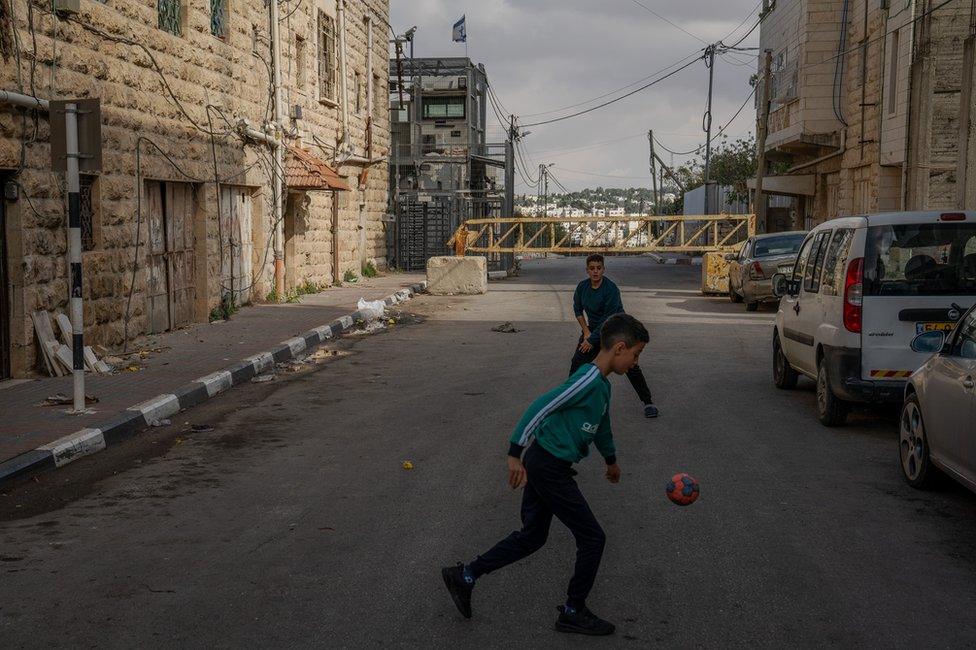
Palestinian boys play football, in front of a checkpoint, just outside H2. Israel restricts movement in and out of the area.
H2 began life in 1997 when Hebron was divided into two sectors, under an agreement between the Palestine Liberation Organisation and Israel. H1, populated entirely by Palestinians and controlled by the Palestinian Authority, accounts for roughly 80% of the city. H2, which accounts for just 20% of the city, is populated almost entirely by Palestinians but controlled by the Israeli military. Within H2, the area around Shuhada Street and the Ibrahimi Mosque is the most fortified by checkpoints and guard posts. It has seen decades of tension, violence, and terror attacks from both sides.
"This is the closed place inside the closed place," said Muhammad Mohtaseb, a 30-year-old hospital security guard, sitting on the roof of his house opposite the mosque.
"We are completely surrounded by checkpoints," he said. "Even on a good day, I cannot drive a car, no car can come in with Palestinian number plates. If I want to bring something to my house, I have to carry it half a kilometre from the checkpoint. When I got married, I bought all new furniture for my bedroom, but I had to take it all apart into pieces on the other side of the checkpoint to get it through the turnstiles, then rebuild it on this side."
That was a good day. Since 7 October, the freedom even to move around in the street was gone. When we arrived at Mohtaseb's home, just like at the home of Fawaz Qafisha, a soldier sprang towards the door and ordered Mohtaseb back inside.
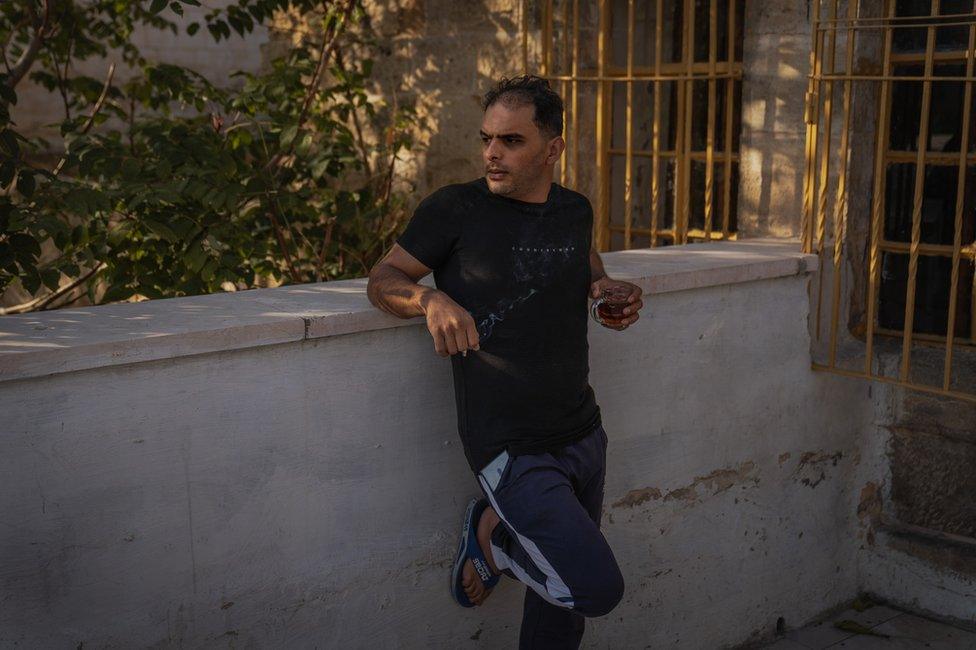
Mohammad Mohtaseb on his rooftop in H2. "This is the closed place inside the closed place," he said.
Up on the roof, Mohtaseb rolled a cigarette and looked out over the empty streets. With three of his four children out of school - the H2 schools have all been closed - Mohtaseb had been at home and away from work for 40 days. Fortunately for him, his employer had been understanding and was still paying him.

More on Israel-Gaza war
Follow live: Latest updates
Gaza Strip mapped: Life in Gaza under siege
Reporting: Assessing video Israel released of tunnel and hostages
Explained: The faces of hostages taken from Israel
History behind the story: The Israel-Palestinian conflict

This was not the case for everyone. Qafisha, the falafel cook, had been unable to fulfil his work responsibilities since the lockdown began, because he could only go out three days a week, and on those three days the allotted hours did not match the hours he would need to travel for work anyway. And unlike Mohtaseb's employer, his had not been understanding. "In these jobs, if you work you eat," he said. "And if you don't work you don't eat."
Qafisha had borrowed money several times from friends, to buy food for the family, but he was running out of options. "Anything that you spend you cannot replace," he said, sitting in his living room, away from the window. "So we are sinking."
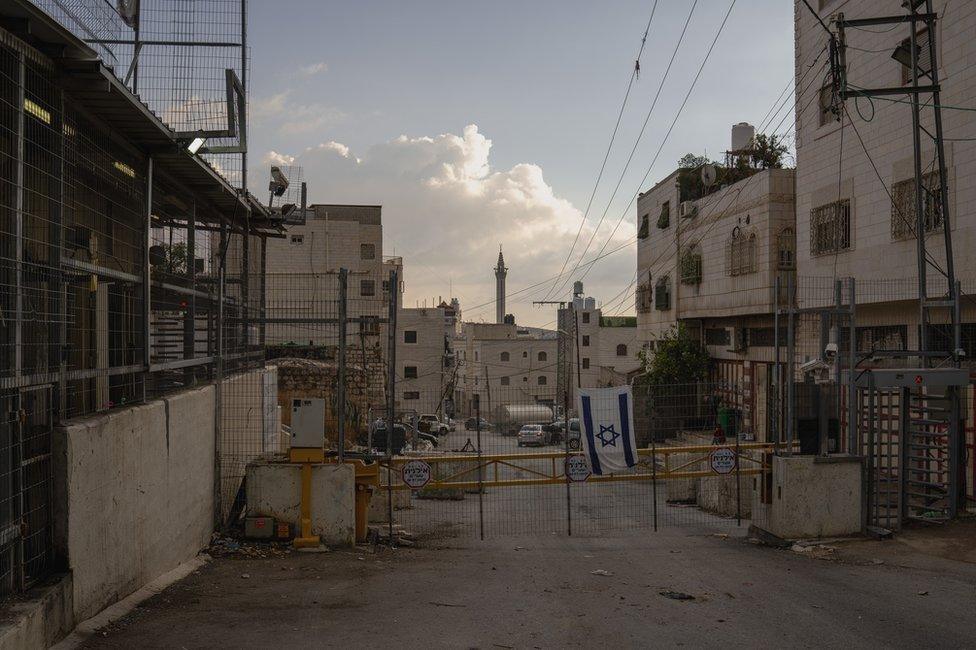
H2 is dotted with more than 100 Israeli checkpoints, guard posts or other security obstacles.
The following morning, there was another armed attack on Israeli soldiers by a Palestinian militant, this one in Hebron itself. This time it resulted in only the attacker's death. But a few hours later, another message was sent out via WhatsApp from the Israeli military to the Palestinian residents of Shuhada Street.
"A notification for the residents of Shuhada Street," it said. "You are forbidden to be in the streets for one week." And if they left H2, it said, they would not be allowed to re-enter until the week had passed.
The lockdown in H2 was a "blatant example of how Israel is implementing collective punishment in the West Bank", said Dror Sadot, a spokeswoman for the Israeli human rights organisation B'Tselem.
"The Palestinians in Hebron are paying a price for something they didn't do," she said. "People cannot go to work, children cannot go to school, they are having trouble getting water and food. It is collective punishment, and it is illegal under international law."
The Israeli military told the BBC in a statement that its forces operate in the West Bank "in accordance with the situational assessment in order to provide security to all residents of the area."
"Accordingly, there are dynamic checkpoints and efforts to monitor movement in different areas in Hebron," it said.
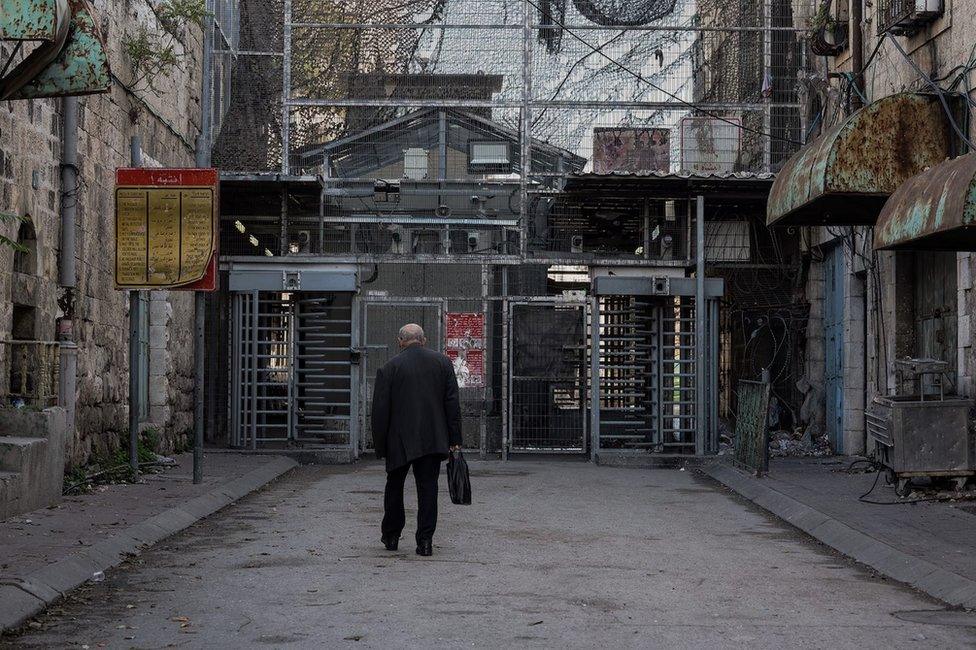
A heavily fortified checkpoint at one entrance to H2. Residents say they are sometimes harassed at the checkpoints. (Tanya Habjouqa/Noor)
Among the Israeli settlers living in H2, in the hardline Kiryat Arba settlement, is Israel's far-right national security minister, Itamar Ben Gvir. On Thursday, Ben Gvir, who has personally overseen the distribution of thousands of new rifles to West Bank settlers since October 7th, said that Israel should take the same approach to the occupied territory that it was taking in Gaza, where more than 11,000 Palestinians have now been killed. "Containment will blow up in our faces," Ben Gvir said, of the West Bank. "Just like it did in Gaza."
According to the Palestinian Health Ministry, more than 200 Palestinians have been killed in the West Bank since 7 October, by settlers or in clashes with the military.
On Wednesday, just a few hundred metres from Ben Gvir's house, Areej Jabari had gathered a small group of women into a knitting circle in her home in H2, in defiance of the Israeli orders not to move in the streets that day. This was only the second successful gathering since the lockdown began, and there were only eight women present, down from around 50 who usually gather once a week at the mosque. The knitters had got there by sleight. "We sneak through the side roads and between the buildings," said Huda Jabari, Areej's younger cousin, with a grin.
The women have learned, this long into the lockdown, to observe the Israeli soldiers and move when they are not looking. They use one another's houses to avoid checkpoints within H2, entering the front door in one sector and emerging from the back door into another. "In normal times, 50 families pass through my house to get around," said Areej's mother Sameera, whose own house sat in the shadow of Ben Gvir's.
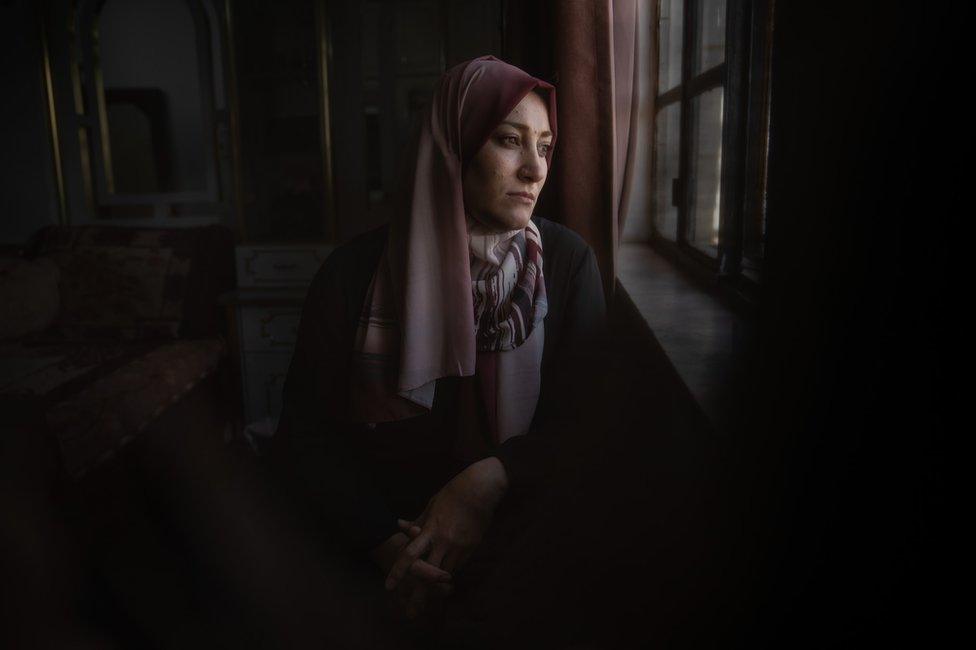
Areej Jabari, a resident of H2, looks out of her window onto the street, which she can no longer use freely.
Areej took us up to her roof to show us her view, over an Israeli military base and guard post close to her house. Below us, Israeli settlers passed by along her street, which she was no longer allowed to use.
Since 7 October, Areej had been coming up here to the roof with her video camera to gather footage of the soldiers and send it to B'Tselem, the human rights organisation. In return, the Israeli military arrived at her house last Saturday and forced their way in, she said. "They broke my press card and warned me not to take any more video or post anything on social media."
They also forbade her to go up onto her roof, she said, or look out of her windows on Fridays or Saturdays, when the Israeli settlers use her road to walk from the settlement to the Jewish holy site near Shuhada Street.
The IDF told the BBC that it was aware of the incident Areej described and was following up with the specific soldiers involved to examine what happened. "We are taking this incident very seriously," a spokesperson said.
To Areej, it did not feel particularly out of the ordinary. "Any time something happens they put more restrictions on us," she said. "The goal is to divide us, to split the area into small pieces and to pressure us to leave."
She was standing up against the railing around the roof of her home, looking out over H2. "I call this area the fortress of steadfastness," she said. She opened her video camera and pointed it in the direction of the Israeli guard post down the road.
Muath al-Khatib contributed to this report. Photographs by Joel Gunter
- Published21 October 2023
